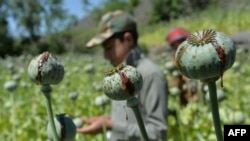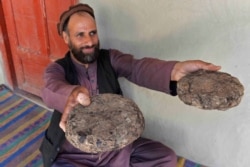The United Nations said Monday that opium cultivation in conflict-ridden Afghanistan increased by 37% in 2020 compared to the previous year, potentially producing an estimated 6,300 tons of opium.
The findings are part of a new survey the U.N. Office on Drugs and Crime (UNODC) conducted in coordination with the Afghan National Statistics and Information Authority (NSIA).
The survey came two days after the United States and NATO allies formally began pulling their troops from Afghanistan, a move intended to close nearly 20 years of international military engagement in the country.
“The total area under opium poppy cultivation in Afghanistan was estimated at 224,000 hectares in 2020, which represents an increase of 37%, or 61,000 hectares, when compared to 2019.”
The survey noted the area under cultivation in 2020 was among the four highest ever measured in Afghanistan.
Poppy cultivation has increased in most regions of the country, with 22 out of 34 Afghan provinces growing the opium poppy last year, decreasing the number of poppy-free provinces from 13 to 12 when compared to 2019.
Afghanistan’s southwestern region, as usual, accounted for 71% of total opium production, while cultivation in the eastern region had reduced by 28%.
Southern Helmand province, which is mostly controlled or contested by Taliban insurgents, remained the country’s major opium poppy cultivating province.
U.N. officials say rule of law-related challenges such as political instability, corruption, instability, and insecurity caused by insurgency groups are among the main factors driving high levels of opium poppy cultivation in Afghanistan.
Socioeconomic factors also impact farmers’ decisions — for example, scarce employment opportunities, lack of quality education and limited access to markets.
Surveyors used satellite imagery to estimate opium poppy yields because the coronavirus pandemic prevented them from collecting opium data in the field.
“This is a demonstration on how NSIA, together with UNODC, we are able to find innovative solutions and to overcome the challenges and still present to the international community the results of the survey,” noted Angela Me, chief of the UNODC statistics and survey section.
The COVID-19 crisis did not affect the 2020 opium season in terms of area cultivated or labor available for harvesting.
The survey, however, cautioned and expected that the economic downturn following the pandemic, in combination with increasing food prices, may lead to further increases in opium poppy cultivation in future years.
A U.S. government agency reported to U.S. Congress in January that Washington has appropriated $9 billion for counternarcotics efforts in Afghanistan since 2002.
However, the Special Inspector General for Afghanistan Reconstruction (SIGAR) said the opium economy had grown exponentially over the period, while interdiction efforts have had “only a minimal impact” on the illicit narcotics trade.
“Importantly, that trade helps fund insurgents, terrorists and criminal networks; fosters corruption; undermines public regard for the government and creates public health and social problems,” SIGAR said.
In 2017, opium production in Afghanistan increased 87% to a record 9,000 metric tons, according to the UNODC. Afghan opiate production accounts for more than 80% of the global morphine and heroin seized.

